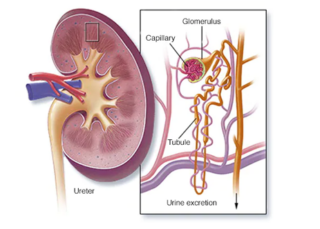Acute Kidney Injury
Is Acute Kidney injury the same as Acute Kidney Failure?
Not all acute kidney injury is Acute Kidney failure. When both the kidneys (solitary kidney function in people with single kidney) reduce to such levels that it is difficult to sustain life without the help of renal replacement therapy (either in form of hemodialysis/Peritoneal dialysis) it is called Acute Kidney Failure.
What are the signs and symptoms of acute kidney injury?
AKI may be subclinical (detected on laboratory testing) or clinical (presenting with symptoms &/or signs). The majority of these symptoms and signs depend on the underlying cause and may include:
• Change in urine output: too little urine formed (very common) vs excess urine output (uncommon)
• Swelling in legs, ankles, or around the eyes
• Poor appetite
• Generalised weakness, fatigue, or tiredness
• Shortness of breath
• Chest pain or discomfort
• Nausea, vomiting
• Abdominal pain or discomfort
• Confusion, seizures, or coma in severe cases
What are the different causes of Acute Kidney Injury?
There are various reasons which can cause acute kidney injury, majorly there are three main causes:
1. Pre-Renal AKI/Decreased blood flow to the kidneys:
Diseases and conditions associated with decreased blood flow to the kidneys include:
• Low blood pressure from any cause
• Blood or fluid loss (such as bleeding, severe diarrhea)
• Heart attack/ heart failure (conditions leading to decreased function)
• Overuse of pain medicines “NSAIDs and COX2 inhibitors” e.g. include ibuprofen, ketoprofen,
naproxen, etc which are used to reduce swelling or relieve pain
• Severe allergic reactions
• Burns, Major Trauma, Major surgery
2. Intra renal/Renal AKI/ Direct Damage to the Kidneys
There are many diseases that may cause direct damage to renal filters and or tubules and can cause AKI. A few examples are listed below
• Severe infection (sepsis)
• Inflammation and scarring of blood vessels (vasculitis)
• Inflammation and/or scarring of kidney tubules and surrounding functioning tissues (interstitial
nephritis)
• Exposure to toxins, solvents, nephrotoxic drugs, and heavy metals
• Some cancers e.g. multiple myeloma
3. Post Renal/Blockage of the urinary tract
This condition results from diseases that cause blockage of urine outflow tract or hinder the ability to empty urine.
• Obstruction from stones or blood clots in the urinary tract
• Enlarged prostate
• Bladder, prostate, or cervical cancer
• Nervous system diseases that affect the bladder and micturination
What tests are done to diagnose acute kidney injury?
Depending upon the suspected/ underlying cause of kidney injury, various tests will be run to: establish a diagnosis, assess the extent of injury, the likelihood of cause of AKI, and prognosticate if possible. Timely diagnosis is of paramount importance since every AKI episode can result in increased morbidity/mortality, risk of cardiovascular events, and predisposition to chronic kidney disease. The following tests may be done:
• Measuring urine output
• Urine tests
• Blood tests: Blood tests will help find levels of creatinine, urea nitrogen phosphorus and
potassium should be done in addition to blood tests for protein in order to look at kidney
function.
• Estimate GFR: using creatinine &/or Cystatin, one may calculate your GFR (glomerular filtration
rate) to estimate the decrease in kidney function
• Imaging tests: Imaging tests, such as ultrasound, may help look for kidneys and urinary tract and look for anything abnormal. In certain cases, a CT or MRI scan may be needed.
• Kidney biopsy: In some clinical situations, renal tissue is sampled by performing a USG-guided Renal Biopsy to help establish diagnosis and guide treatment.
What is the treatment for acute kidney injury?
Treatment for acute kidney injury depends on the underlying cause and often requires you to be hospitalized for the same. Various treatment options are available which vary from case to case basis. For Acute Kidney Injury Treatment, Visit our website.
• Prevention of acute renal injury in high-risk populations is the best treatment e.g. Extremes of age, Diabetics, Hypertensive, patients on pain medicines, etc.
• Early detection and remedial measures address managing the underlying causes of injury
• Treatment of your symptoms and signs including correction of electrolyte, acid-base, and fluid balance in patients with established injury until your kidneys recover
• Few patients may need renal replacement therapy in from of dialysis to support failing kidneys to manage fluid/ acid-base or salt balance or remove toxins that have built up in your blood.
The best way to reduce your chance of having acute kidney injury and save kidney function is to prevent injury or to find and treat it as early as possible.
About Us
Swanand Kidney Clinic, Shop No. 6,
B Wing, Jai Ganesh Samrajya,
Pune Nashik Highway, Sector 3,
Bhosari, Pune 411039
OPD Number 5, Ground Floor,
Imperial Multispeciality Hospital,
Pingale Pride, Near Radha Swami
Ashram, Chikali, Pune 411062
drsnehalghanwat@gmail.com
Mobile Number:+91 9579747489

